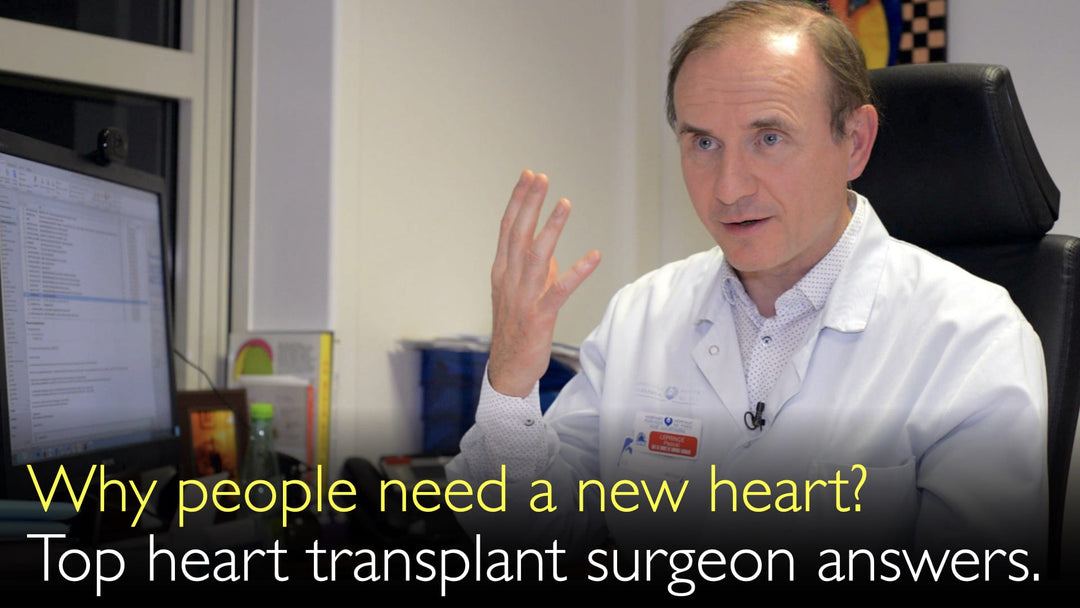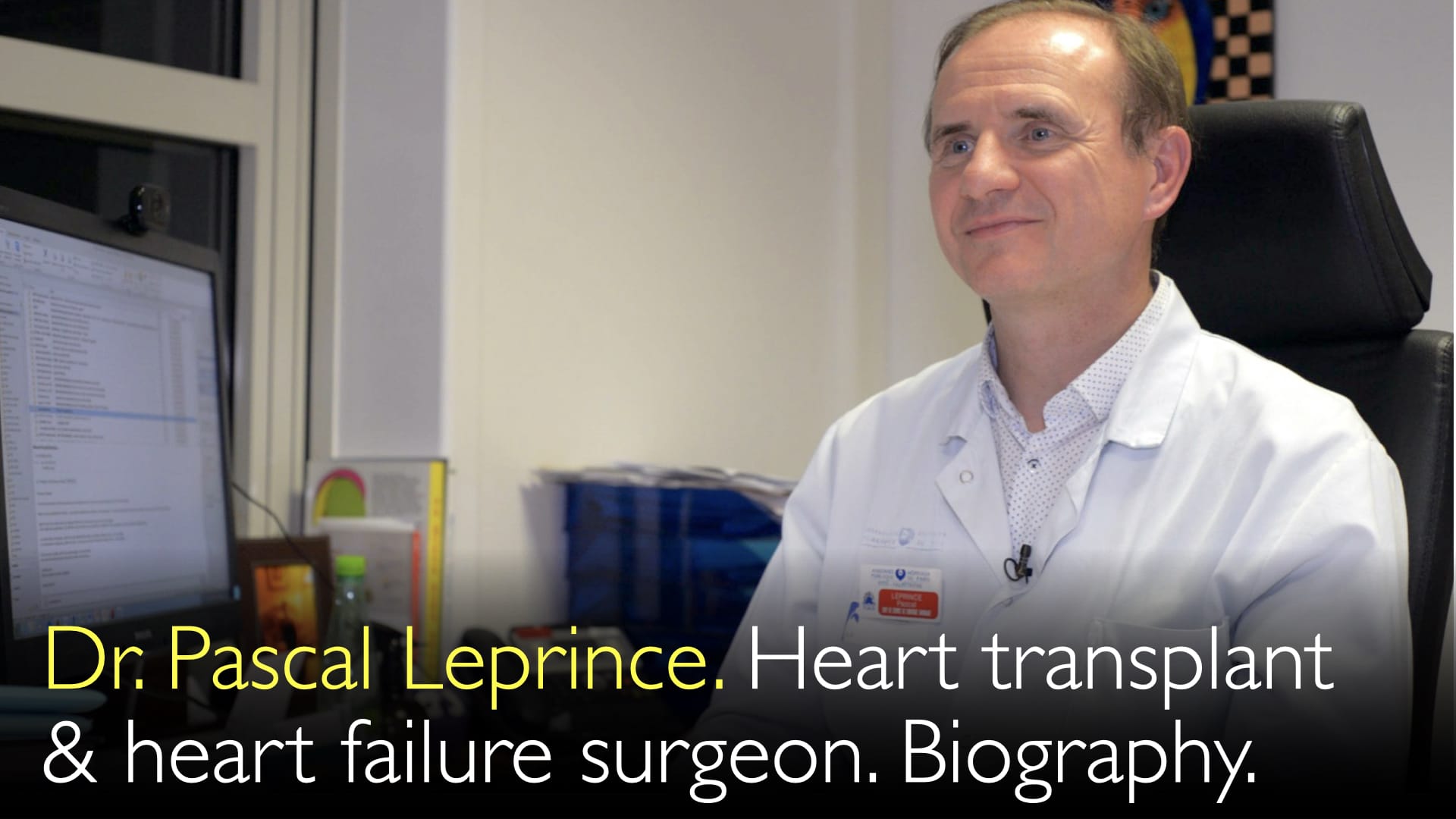O renomado especialista em transplante cardíaco, Dr. Pascal Leprince, esclarece as principais causas da insuficiência cardíaca terminal que exige um novo coração. Ele detalha que a cardiopatia isquêmica e a miocardiopatia dilatada idiopática representam a grande maioria dos casos de transplante em adultos. O Dr. Leprince ressalta ainda uma questão crucial de saúde pública: uma parcela significativa dos casos de insuficiência cardíaca terminal poderia ser evitada com cuidados médicos adequados e adesão do paciente ao tratamento — um desafio que persiste mesmo em sistemas de saúde avançados, como o da França.
Principais Causas e Natureza Prevenível da Cirurgia de Transplante Cardíaco
Navegar para a Seção
- Indicações Comuns para Transplante Cardíaco
- Doença Isquêmica do Coração e Transplantes
- Cardiomiopatia Dilatada Idiopática
- Outras Causas para Transplante Cardíaco
- A Tragédia da Insuficiência Cardíaca Prevenível
- Um Desafio Significativo de Saúde Pública
- Transcrição Completa
Indicações Comuns para Transplante Cardíaco
O Dr. Pascal Leprince, cirurgião de transplante de renome, descreve as principais razões pelas quais os pacientes necessitam de um transplante cardíaco. As indicações variam bastante conforme a faixa etária. Em pacientes pediátricos, a principal indicação são as malformações cardíacas congênitas. O Dr. Leprince ressalta que seu centro no Hospital Pitié-Salpêtrière não realiza cirurgia cardíaca pediátrica, sendo esse tipo de procedimento feito em instituições como o Hospital Necker, em Paris.
Doença Isquêmica do Coração e Transplantes
Em adultos, a doença isquêmica do coração é uma das principais causas de insuficiência cardíaca terminal. Segundo o Dr. Pascal Leprince, essa etiologia responde por cerca de 40% dos transplantes cardíacos. A condição surge em pacientes com doença arterial coronariana que sofreram um infarto do miocárdio. O dano causado pelo infarto leva a uma insuficiência cardíaca progressiva, que se torna intratável com medicamentos ou outras intervenções, tornando o transplante a única opção viável para salvar a vida.
Cardiomiopatia Dilatada Idiopática
A outra causa principal de transplante cardíaco é a cardiomiopatia dilatada idiopática. O Dr. Pascal Leprince explica que essa condição representa entre 40% e 45% dos casos em adultos. O termo “idiopática” indica que a causa exata é desconhecida, embora muitos casos tenham origem familiar ou estejam ligados a mutações genéticas específicas. Nessa condição, o músculo cardíaco fica enfraquecido e dilatado, perdendo a capacidade de bombear sangue com eficiência. Juntas, as causas isquêmicas e idiopáticas representam de 85% a 90% dos motivos que levam um adulto a precisar de um novo coração.
Outras Causas para Transplante Cardíaco
Além das duas causas principais, o Dr. Pascal Leprince identifica outras condições que podem levar à insuficiência cardíaca terminal. Entre elas, está a amiloidose, doença em que proteínas anormais se acumulam em órgãos e tecidos, prejudicando a função cardíaca. Outras razões incluem cardiomiopatia arritmogênica e cardiomiopatia hipertrófica que evolui para insuficiência cardíaca grave. Embora menos frequentes, essas condições são igualmente graves e muitas vezes exigem o transplante como tratamento definitivo.
A Tragédia da Insuficiência Cardíaca Prevenível
Um ponto crucial destacado pelo Dr. Pascal Leprince é que muitos casos de transplante cardíaco poderiam ser evitados. Ele revela que, em sua experiência no Hospital Pitié-Salpêtrière, de 25% a 30% dos pacientes chegam à insuficiência cardíaca terminal por não seguirem as orientações de tratamento que poderiam ter impedido a progressão da doença. Isso é especialmente surpreendente considerando o sistema de saúde avançado e acessível da França, onde o custo para o paciente é mínimo. A falta de adesão a medicamentos ou a mudanças no estilo de vida, como evitar o consumo excessivo de álcool, leva diretamente a casos evitáveis de insuficiência cardíaca.
Um Desafio Significativo de Saúde Pública
O Dr. Pascal Leprince aborda essa questão como um grande desafio de saúde pública, e não como simples negligência do paciente. Ele observa que disparidades socioeconômicas e intelectuais criam barreiras ao cuidado, mesmo quando o acesso é facilitado. Muitos pacientes não compreendem a importância de tomar medicamentos ou as graves consequências de certos comportamentos. O Dr. Leprince confirma que cardiologistas e especialistas em saúde pública observam taxas mais altas de insuficiência cardíaca em áreas da Grande Paris com menor nível socioeconômico. Isso evidencia a necessidade de melhorar a educação do paciente e ampliar o alcance comunitário para prevenir a insuficiência cardíaca terminal antes que um transplante se torne necessário.
Transcrição Completa
Dr. Anton Titov, MD: Transplante cardíaco. Você dirige um dos maiores departamentos da Europa nessa área. Foi publicado que você realiza mais de 90 transplantes cardíacos por ano. Quais são as indicações mais comuns hoje para o transplante cardíaco? Talvez por faixa etária.
Às vezes olhamos para crianças. A principal indicação é a malformação cardíaca congênita. Uma segunda opinião médica é importante.
Dr. Pascal Leprince, MD: Não fazemos cirurgia cardíaca pediátrica aqui no Hospital Salpetriere. Outros hospitais em Paris, como o Hospital Necker, realizam esse tipo de procedimento.
Em adultos, temos duas principais indicações para transplante cardíaco. Duas etiologias para insuficiência cardíaca. Uma delas é a isquemia. São pacientes com doença arterial coronariana que sofreram um infarto do miocárdio e depois desenvolveram insuficiência cardíaca. Diria que isso representa 40% dos pacientes que precisam de transplante.
Outros 40% a 45% dos pacientes têm cardiomiopatia dilatada idiopática. “Idiopática” significa que não sabemos a causa. Muitos têm cardiomiopatia familiar. Alguns pacientes têm vários familiares com cardiomiopatia grave. Outros apresentam uma mutação genética que causa a cardiomiopatia dilatada. Em alguns, simplesmente não sabemos o motivo.
Essas são as principais causas de insuficiência cardíaca em adultos. Representam 85% a 90% dos motivos para transplante cardíaco em adultos. Outras razões incluem a amiloidose. Existem dois tipos de amiloidose. Isso começa a ficar muito técnico. Eu mesmo não entendo todos os detalhes dos subtipos.
Há também a cardiomiopatia arritmogênica e a cardiomiopatia hipertrófica que evolui para insuficiência cardíaca. Nessas situações, o transplante cardíaco se torna necessário. Essas são as principais razões para transplante em pacientes adultos.
Algo que tenho repetido há muitos anos: se observarmos os pacientes que precisam de transplante cardíaco por insuficiência cardíaca terminal, na nossa coorte do Hospital Pitie Salpetriere, pelo menos 25% a 30% chegam a esse estágio por não seguirem as orientações de tratamento que poderiam ter evitado a progressão da doença.
Isso é absurdo, porque na França é fácil ter acesso à saúde. Há países onde o acesso não é fácil, mas aqui o custo para o paciente é quase zero. Todos podem ir a um hospital.
É impressionante, porque a França tem um dos sistemas de saúde mais avançados da Europa. Médicos e pacientes aqui estão entre os mais satisfeitos do continente. Concordo.
Mas mesmo com acesso facilitado, alguns pacientes, por questões socioeconômicas ou intelectuais, estão distantes do cuidado. Eles não pensam em saúde. Não vão ao médico, mesmo sendo fácil.
Eles não entendem que tomar remédios é crucial. Não percebem que beber dez cervejas por dia faz mal. Não compreendem isso. Não os culpo; talvez não tenham tido educação suficiente.
É uma pena, porque quando esses pacientes chegam ao transplante cardíaco por falta de informação ou cuidado prévio, fica claro que algo precisa mudar. Isso é algo que todos deveriam conseguir entender.
Ontem eu discutia isso com um de nossos cardiologistas. Ele é muito bom e analisa indicadores de saúde pública. Ele concorda plenamente comigo.
Até mesmo na região metropolitana de Paris, há áreas onde a qualidade de vida e o status socioeconômico são mais baixos. Nessas regiões, a taxa de insuficiência cardíaca é maior do que no centro de Paris. Uma segunda opinião médica é importante. Isso é significativo para mim.





